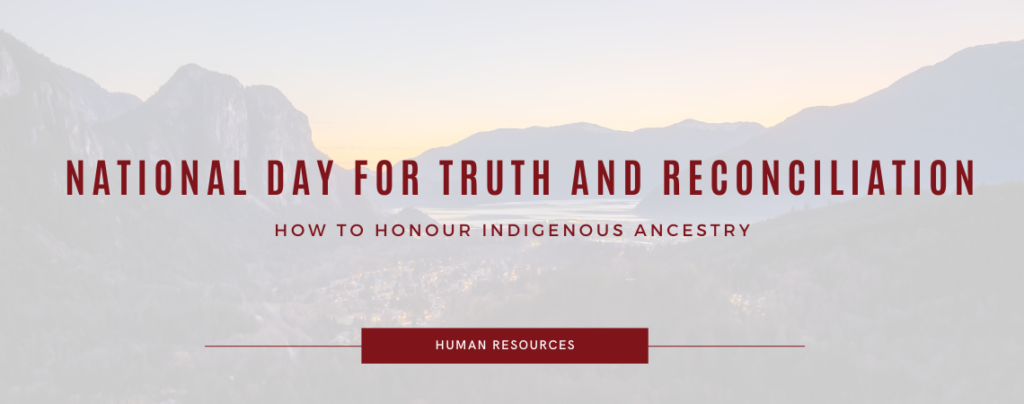
September 30th marks a significant day in Canada’s calendar: National Day for Truth and Reconciliation. Established to honour the survivors of church- and government-run schools and acknowledge the ongoing impact of these institutions, this day is a call to reflect, learn, and commit to meaningful change.
The Significance of Truth and Reconciliation Day
The church- and government-run schools, operated from the late 19th century until 1997 (which was not that long ago), aimed to erase Indigenous cultures and languages. Children were forcibly removed from their families and communities, assimilated, and robbed of their cultural heritage and traditions. The ongoing impact of these schools is still felt heavily today by Indigenous Peoples and their communities.
The repercussions of these schools are profoundly felt in Indigenous communities today, where the effects of trauma, loss of language, and cultural disconnection persist. Recognizing the long-term impacts of these government-funded institutions is crucial, especially as systemic discrimination against Indigenous peoples continues to manifest in various aspects of life in Canada.
Truth and Reconciliation Day, established in 2021, serves as a national day of remembrance and reflection. It’s a time to honour those who endured the church- and government-run school system.
It’s our shared responsibility to work towards reconciliation.
The TRC’s Calls to Action for Employers
The Truth and Reconciliation Commission of Canada (TRC’s) Calls to Action (CTAs) aim to foster reconciliation between Indigenous and non-Indigenous Canadians.
There are 94 CTAs that TRC outlines in their 2015 report. Specifically, CTA 92 speaks directly to what businesses can do to move the needle forwards for reconciliation.
Below are the three specific commitments for CTA 92, summarized:
- Ensure that Indigenous peoples are meaningfully consulted and provide their free, prior, and informed consent before any economic development projects proceed. This involves building respectful relationships, listening to their concerns, and ensuring they fully understand the potential impacts of the project.
- Ensure that Aboriginal peoples have equitable access to jobs, training, and education opportunities within the corporate sector. Additionally, ensure that Aboriginal communities gain long-term, sustainable benefits from economic development projects, rather than short-term gains.
- Provide education and training for management and staff on the history of Aboriginal peoples, including the historical and ongoing impacts of church- and government-run schools. This should also include training on the United Nations Declaration on the Rights of Indigenous Peoples, Treaties and Aboriginal rights, Indigenous law, and Aboriginal-Crown relations. To effectively implement these initiatives, skills-based training in intercultural competency, conflict resolution, human rights, and anti-racism is essential.
Today provides an opportunity for all Canadians to reflect on the history and ongoing effects of church- and government-run schools, but it doesn’t end there. It’s essential that we continue to educate ourselves about Indigenous cultures, histories, and the experiences of survivors as we move forwards together.
What Actions Can You Take as an Employer?
- Educate yourself and your team by exploring the history of church- and government-run schools and their lasting impacts. Tip: Find a book that your team can read and discuss together – there are many Indigenous authors that offer their perspectives on reconciliation and the effects of these government-funded institutions.
- Support local Indigenous businesses and organizations. At Envol, we partner with Indigenous owned organizations on projects, but we also love to order food from local Indigenous vendors for team & client lunches! A thoughtful (and yummy) way to support locals.
- Offer training for your team for Indigenous cultural awareness. This provides opportunities for employees to learn about traditions, perspectives and culture.
- Volunteering or making a monetary donation. Giving back in any capacity is a great way to show support!
Honouring Indigenous Ancestry
Truth and Reconciliation Day is a call to action for all Canadians. By acknowledging the painful history of church- and government-run schools and committing to meaningful change, we can work together to build a more inclusive and equitable society.
It’s an ongoing journey that requires courage, empathy, and a willingness to listen, learn, and un-learn.
Identifying a starting point can be tough. If you’re not sure where to begin, join us for an exclusive in-person breakfast event on October 22nd, where Johnathon Strebly, former Chief of Staff at Skwxwú7mesh Úxwumixw (Squamish Nation), will share how we can incorporate cultural respect into our organizational practices through creating authentic land acknowledgements.
We are honoured to be joined by Xwechtaal Dennis Joseph, Squamish Nation Elder, who will share a traditional blessing song from his people.
Seats are limited – RSVP today to save yours!
All proceeds from this event will be donated to Indspire, an Indigenous charity that invests in the education of First Nations, Inuit and Métis people across Canada.
Additional Resources for Continued Learning
Looking for additional learning resources to share with your team? We return to these ones regularly: